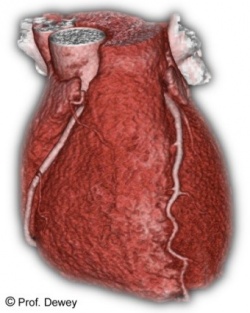BMJ study
CT reduces cardiac catheterisations
Over 3.5 million cardiac catheterisations are performed in Europe each year. A study jointly conducted by radiologists and cardiologists at Charité – Universitätsmedizin Berlin and published in the latest issue of The BMJ compares CT with cardiac catheterisation in patients with atypical chest pain and suspected coronary artery disease (CAD). Please find below a few details regarding the study results, as explained by Professor Marc Dewey, the principal investigator of the study.

What does the BMJ study show?
CT reduced the need for cardiac catheterisation from 100% to 14% in the group of patients who received CT first instead of catheterisation. If catheterisation was needed in the CT group, the proportion of catheterisations showing obstructive CAD was 5 times higher than in the catheterisation group. Over a period of 3.3 years, the patients in the CT group neither had more cardiac catheterisations nor an increase in cardiovascular events. Moreover, CT shortened the length of stay by 23 hours and 79% of patients said they would prefer CT for future examinations of the heart. Overall, the results of the BMJ study show that CT is a gentle test for reliably ruling out CAD in patients with atypical chest pain who are currently being referred for cardiac catheterisation in routine clinical practice.
What do the results mean for future patient care?
Along with the results of other randomised studies, the BMJ study provides ample evidence for the benefit of cardiac CT examinations. I therefore think that it is now time to enter into serious discussions to make CT a diagnostic test to be reimbursed by health insurance. There is also an urgent need for further research funding from European governments and the European Commission to investigate implications for healthcare costs and the role cardiac CT could play in novel preventive strategies.
Source: ESR
08.11.2016


